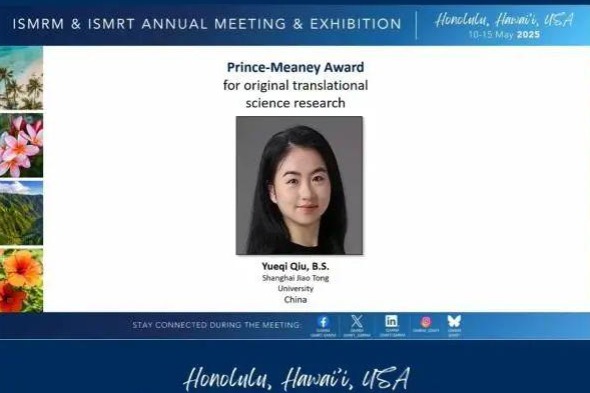Millions vie for college spots as reforms boost fairness and opportunities

BEIJING -- As a rare hush replaces the usual rustle of pages and scribbled notes, 13.35 million students in China close their textbooks one final time, moving from intense preparation to the calm before the storm.
On Saturday, bright young minds from across the country will participate in the college entrance exam, seeking the best possible opportunities to chase their dreams and casting a vote of confidence in the country's higher education system.
Since its reinstatement in 1977, the unified exam, known as the gaokao, has transformed millions of lives through merit-based selection. As a powerful social equalizer, it reinforces the belief that with hard work and determination, any student can shape a successful future.
While the intense competition has long been a subject of national attention -- once likened to "thousands of troops crossing a single-plank bridge" -- reforms over the past decade have gradually expanded students' choices in the matriculation system, while maintaining a strong commitment to fairness.
According to the latest available figures from the Ministry of Education, China's gross enrollment rate in higher education had surpassed 60 percent by 2023. More than 47 million students studied at colleges and universities that year.
Prior to this year's gaokao, one of the country's vice-premiers inspected an enrollment and examination center and an exam site at a school in North China's Shanxi province.
Noting that the exam concerns the immediate interests of millions of families, Ding Xuexiang said that fairness and equity must be upheld, calling them the "lifeline" of the gaokao.
To ensure smooth traffic for students, cities across China are stepping up efforts with temporary traffic controls around test centers, keeping the roads clear and congestion at bay. For students facing travel difficulties, many cities are rolling out free ride services to make sure no one is left behind.
Silence will also be the order of the day -- honking around exam venues will be banned, and nearby construction will come to a halt.
Within certain exam halls, technicians are busy fine-tuning AI-powered surveillance systems that can flag unusual behavior and rule violations in real time, effectively eliminating any opportunity for cheating.
Liu Boyang, a student from Southwest China's Chongqing municipality, will sit the gaokao on Saturday. He hopes to study medicine. "I might choose a major related to intelligent medical engineering, as smart technology is the direction of future development," he said.
This year, universities and colleges have introduced 29 new majors, including low-altitude technology and engineering, geriatric medicine and health, and carbon neutrality science and engineering.
"A lot of these new majors are tied to national strategies and really open doors to the careers of tomorrow," said Fu Xiaoying, a college admissions advisor.
There are about 3,000 colleges and universities across the country. In recent years, the government has elevated the status of vocational education, bringing it on par with general education. Key measures include extending bachelor's degree programs to the vocational education system and allowing secondary vocational students to take the gaokao.
In some cases, higher education vocational programs may be more appealing than traditional university degrees.
A vocational-and-technical college in Zhengzhou, Central China's Henan province, recently made headlines for requiring applicants to already possess a bachelor's degree to apply for its high-speed rail equipment testing program, even though the diploma awarded is an associate degree.
This unusual requirement reflects strong job prospects and the high level of technical skills these roles represent, said Chen Zhiwen, a member of the academic committee at Chinese Society of Educational Development Strategy.
As society becomes more diverse, Chinese students can pursue their ambitions through pathways beyond traditional academic routes. The gaokao is no longer a single-plank bridge but a wide junction of diverse paths.
Though it remains imperfect, this matriculation system is considered one of the most efficient ways to achieve fairness in education for a population of 1.4 billion.
"I think the gaokao really levels the playing field for most students in China," said Chen Hanting, an 11th grader from Beijing's Chaoyang district.
"After all, my family can't fund an elephant conservation trip to Africa or land me an internship with a foreign politician to boost my college application," said Chen, whose father runs a video game studio and whose mother is a senior editor at a newspaper.
For years, rumors spread that graduates from China's elite universities were heading abroad in large numbers. However, experts and university officials clarified to the media that there hasn't been a mass exodus -- rather, the fact is that fewer students are now choosing to pursue studies abroad.
At Tsinghua University, for example, the proportion of graduates continuing their education overseas dropped from about 15 percent in 2018 to just 8 percent in 2023, according to the university.
"For the advancement of science and technology, we need to encourage greater international exchange in both the humanities and scientific fields," said Zhang Chao, former director of student career development at Tsinghua.
China has experienced a noticeable decline in the willingness of students to pursue international education, reversing the surge in the early 2000s.
A report from the Institute of International Education revealed that the number of students from the Chinese mainland studying in the United States fell 4.2 percent year-on-year to approximately 277,000 in the 2023-2024 academic year, a level last seen in 2013-2014.
The decline is particularly pronounced at the undergraduate level, with a year-on-year drop of 12.8 percent, according to the report.
Experts point to uncertainties arising from geopolitical tensions and disruptive measures, such as the threat of sudden visa cancellations for students.
Chen Zhiwen attributed this shift to rising national pride, driven by two decades of economic growth, improved living standards, and -- perhaps most importantly -- increasing confidence in domestic higher education.
"We're unlikely to go abroad for undergraduate studies. Right now, studying at a Chinese university is hands down the most cost-effective option," said Chen Hanting's father.
- Millions vie for college spots as reforms boost fairness and opportunities
- Xi receives visit from Panchen Rinpoche
- China's northern, southern regions enter flooding season in June
- Xinjiang celebrates Corban Festival with feasts and traditions
- Chinese courts step up handling of maritime cases
- 'Beer stock market' draws huge crowds in Qingdao



































